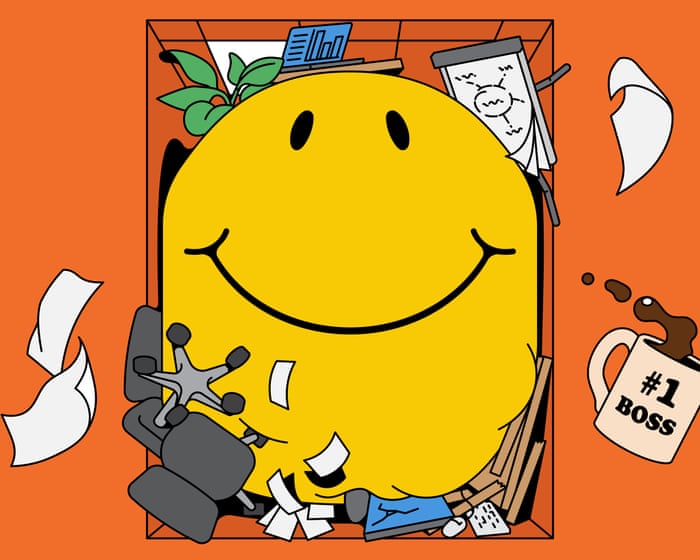Who would ever call work fun? Sure, your job might be rewarding—sometimes. You might get along with your colleagues—some of them. But fun? That seems both too lofty a goal and too trivial.
After the work-obsessed “hustle culture” of the 2010s, followed by the burnout and backlash of the Covid-19 pandemic, the general attitude toward work today is ambivalent at best. At worst, it’s openly hostile, as seen in the ongoing “battle” over remote work. Managers want employees back in the office; employees want flexibility and to keep work from taking over their lives.
Gen Z, now the youthful force shaping the workforce, is especially firm about protecting their boundaries. Meanwhile, AI looms on the horizon, threatening widespread job losses.
The world of work is in turmoil, with a struggle over our time and livelihoods at its core. Fun doesn’t seem to be part of the equation—but Bree Groff argues it should be.
Employees often ask themselves, “Do I want to change the world, or just go home and cook dinner?”
Groff, an organizational consultant and “change expert” at New York-based SYPartners, has worked with top executives at companies like Google, Microsoft, Hilton, Calvin Klein, and Pfizer to transform corporate culture and improve employees’ work lives. Drawing on that experience, she’s written her first book, Today Was Fun, which proposes a new approach: What if work wasn’t our sole source of meaning, or a necessary evil to endure, but simply “a nice way to spend our days”?
It might sound naive, but Groff’s light tone masks a wise insight: work should be enjoyable. Too often, it’s out of balance. We either “live to work,” tying our self-worth to productivity and merging our identity with our job, or we resign ourselves to the idea that “work sucks” and live for the weekend.
Neither outlook is particularly healthy, sustainable, or fulfilling. Today Was Fun calls for a recalibration—raising and lowering our expectations of work’s role in our lives. As Groff writes, “Work should be a source of joy, because it’s fundamentally good—and it should be only one of many joys.”
She came to this realization in January 2022 when her mother was diagnosed with terminal cancer; her father already had Alzheimer’s. As an only child, Groff took immediate leave to care for them. Her mother’s death later that year gave her a new perspective on how she spent her time. “I’m going to run out of Mondays, just like my mother did… there was this newfound urgency.”
At the same time, Groff noticed the post-pandemic crisis in employee engagement, evident in trends like “the Great Resignation” and “quiet quitting”—doing the bare minimum. “I felt like I had something to share that could help people,” she says.
Groff knew “for a fact” that work could be fun. She grew up in Chicago, where her mother was a kindergarten teacher and her father an elementary school principal. Both clearly loved their jobs without letting work dominate their lives or define who they were.
It was a shock when Groff entered the workforce herself and found it burdened by so much excess: endless meetings, no time for breaks, constant emails, and pointless busywork. The problem isn’t work itself, Groff says, but all the “patently ridiculous, if not outright dangerous” rituals and norms that surround it.One of the biggest expectations that comes with work is that it may come at the expense of sleep, relationships, or wellbeing. But as Groff points out, we get paid to create value, not to suffer. “At its core, work is about showing off our skills, creating something others appreciate, collaborating with people, and solving challenges. If that part is enjoyable, how can we hold onto it?”
She suggests one way is to rethink “professionalism,” which is often restrictive, promoting only one narrow idea of leadership or success and discouraging people from bringing their full selves to work. “You end up just playing along, as if you’re in a performance,” Groff says.
She appears on Zoom with her hair still wet from the shower—a small, everyday act of resistance against what she sees as dreary, rigid, and even infantilizing professional dress codes. “You’re just as smart in workout clothes as you are in a blouse,” she tells me when I admit to wearing leggings off-camera.
Since the pandemic, there’s a growing sense of fatalism that keeps us from trying to improve work. “We’ve normalized the idea that work is just drudgery, something we do because we have to,” Groff says.
This might be an overreaction to hustle culture, which emerged from the Silicon Valley startup boom. Tech founders and influencer-entrepreneurs convinced a generation that success meant embracing the “grindset.” With perks like free meals, endless snacks, and even office ball pits, work was supposed to be fun—not a sacrifice.
But Groff sees this as more of a bribe. “Companies want employees to have fun so they’ll overwork and devote their lives to the business,” she says. “You start to wonder: Was that free lunch just to keep me from leaving the building?”
Even learning and development programs, often presented as a benefit, can be a way to mold people into company assets, Groff argues. With companies like Apple, Meta, and Google even paying for employees to freeze their eggs, “it starts to feel like a dystopia. The more intertwined we become with our employers, the harder it is to maintain independence or leave.”
As burnout has become a mainstream concern, more people recognize that relying on work for happiness, identity, or meaning can leave you vulnerable to exploitation.
Groff notes that C-suite executives have a bigger stake in their company’s success, which is reflected in their pay. They shouldn’t expect the rest of the workforce to feel the same motivation to go above and beyond.
“Think about what has to come first,” she says. “If you’re stressed and sleep-deprived, you’re probably not having fun.”
“It’s easy for leaders to say, ‘We’re changing the world,’ but that puts employees in a tough spot—having to choose between changing the world and going home to cook dinner.”
The debate over hybrid and remote work is eroding trust on both sides, Groff adds, leading to more surveillance from management and presenteeism—showing up sick and being less productive—from employees. A lack of flexibility is also widely blamed for declining engagement. According to Gallup’s recent State of the Global Workplace report, only one in ten UK workers feels engaged, one of the lowest rates globally. In the US, it’s nearly one in three—still a ten-year low.
Perhaps, Groff suggests…If work were more enjoyable, there wouldn’t be the same power struggles over where people work—they might even look forward to coming into the office. Research consistently shows that fun is a key factor in whether people thrive or just get by at work. For example, a Gallup survey of German adults found that 81% of engaged employees had fun at work in the past week, compared to only 10% of those who were disengaged. Researchers concluded that being unhappy at work can make life worse than having no job at all.
There’s a strong business case for making work more fun, but that’s not the main reason to focus on it, says Groff. In her book Today Was Fun, she compares it to rest: while it boosts productivity, the real value is that it makes life more enjoyable. Fun is a useful measure because it can’t be forced or faked. Instead of trying to lure employees back with perks like free lunches, employers should think about what the workplace feels like. Are people—especially leaders—relaxed, happy, and joking? Is it a fun environment, or is everyone stuck in meetings all day in formal attire?
Although Groff focuses mainly on office workers, she believes everyone’s work experience could be improved by adding more fun. Even in a steel mill, there’s likely a break room where people can connect. Surgeons, for instance, sometimes lighten the mood. Groff cites Peter Attia, a Stanford-trained surgeon who played clips from Napoleon Dynamite during transplant procedures. Attia said his team laughed constantly for a month, and it may have even improved patient outcomes.
While it’s unrealistic to expect work to be fun all the time, aiming for most days to include some enjoyment can provide helpful direction. Asking, “Did I have fun today?” can be surprisingly clarifying. Groff notes that certain conditions need to be in place first—if you’re stressed and sleep-deprived, fun is unlikely.
Of course, Groff acknowledges that sometimes a job is just a job, especially in tough economic times. But even small changes can improve your daily experience. With a bit of planning, you can often shift things toward the kind of days you want to have.
Life is too short to spend five days a week counting down the hours. Our ability to have fun might even give us an edge over AI. Robots can’t enjoy themselves, so they can handle the dull, repetitive tasks, while we focus on work that emphasizes joy, relationships, and well-being.
You don’t need to feel like you’re changing the world or miserable about your job—but could you have a good day, improve someone else’s life, or make a friend? Maybe that’s enough.
As we wrapped up our conversation, Groff with wet hair and my cat making a cameo on camera, we agreed: today was fun.
Five Ways to Make Work More Fun
1. Make it personal
Many “professional” norms aren’t essential. Personalize your workspace with mementos, stationery, or items that help you focus. Wear clothes that make you happy, and avoid jargon to keep things human.
2. Connect with colleagues
Our experience at work is deeply tied to the people around us.Our work experience is heavily influenced by our immediate colleagues. Groff recommends that leaders build team spirit and unity by holding a daily check-in where everyone rates how they’re feeling on a scale of one to five—using their fingers to show the number. “It’s nice to care about how each other is doing,” she says.
Share your ‘user manuals’
Everyone has their own preferred way of working. By discussing individual styles and preferences with your colleagues—and sharing your own—you can reduce friction, make work more enjoyable, and strengthen relationships. Groff suggests asking each other how you handle stress, how colleagues can support you, and what skills you’d like to share or learn. You could even create personal “user manuals” to guide these conversations.
‘Thin-slice’ your joy
Even during difficult times, it’s possible to find moments of joy in a day, an hour, or even a minute—what Groff calls “thin-slicing” joy. Enjoy a coffee before a challenging meeting, take a walk at lunch and notice the flowers or greenery, or schedule a call with a coworker to vent. Even sharing a joke can lighten the mood and make a tough day easier.
Go where the fun is
If your workplace remains unenjoyable despite your best efforts, Groff suggests it might be time to move on. “You don’t need a complex justification for leaving a job… Every day you spend in a role that isn’t right for you is one of your limited days on this planet.”
Today Was Fun: A Book About Work (Seriously) by Bree Groff is published by Page Two Books, Inc (£19.99).
Do you have thoughts on the topics discussed in this article? If you’d like to submit a response of up to 300 words by email for potential publication in our letters section, please click here.
Frequently Asked Questions
Of course Here is a list of helpful and clear FAQs about making a job you dislike more enjoyable
General Beginner Questions
Q I hate my job but I cant quit right now What can I do
A Focus on what you can control You can change your perspective find small moments of joy and improve your daily experience without making a huge career change immediately
Q What does finding small moments of joy at work actually mean
A It means consciously looking for and appreciating tiny positive things throughout your day This could be a great cup of coffee a funny chat with a coworker completing a single satisfying task or listening to your favorite podcast during your commute
Q How can letting my personality shine help me hate my job less
A When you suppress your true self work feels draining and inauthentic Bringing your personality to workthrough your sense of humor how you decorate your desk or your communication stylemakes you feel more engaged and less like youre just playing a role
Q Isnt this just about pretending to be happy
A Not at all Its not about faking happiness Its about actively seeking out and creating genuine positive experiences for yourself to counterbalance the negative aspects of your job Its a strategy for coping and improving your wellbeing
Practical Tips Strategies
Q What are some easy ways to find joy at a boring job
A
Personalize your space Add a plant family photos or a fun mug
Create minirewards Promise yourself a short walk or a favorite snack after finishing a tough task
Curate your soundtrack Listen to music or podcasts that boost your mood
Find a work friend Having even one positive connection can make a huge difference
Q How can I make tedious tasks more enjoyable
A Try gamifying them Set a timer and race against the clock or break a huge boring project into tiny pieces and celebrate finishing each one Pair the tedious task with something you enjoy like listening to music
Q My job is socially draining How can I protect my energy
A Schedule short breaks for yourself to recharge in silence Learn to set gentle boundariesits okay to say I need



